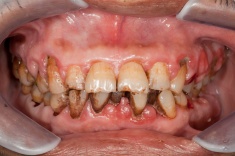Based on the most recent national oral health survey, most Irish adults suffer from some form of periodontal disease; 18% of 16–24 year olds, 8% of 35–44 year olds and 7% of older people aged 65 years and over have healthy gums.
The two most common types of this disease are:
- Gingivitis – which is inflammation of the gum at the necks of the teeth
And
- Periodontitis – inflammation which affects the bone and tissues of the teeth.

In more detail- Gingivitis
Characterised by redness of the gum, swelling and even bleeding on brushing.
Gingivitis occurs in both chronic and acute forms. Acute gingivitis is usually associated with specific infections, micro-organisms, or trauma. Chronic inflammation of the gum tissue surrounding the teeth is associated with plaque that covers the teeth and gums. Gingivitis was once seen as the first stage in a chronic degenerative process which resulted in the loss of both gum and bone tissue surrounding the teeth. It is now recognised that gingivitis can be reversed by effective personal oral hygiene practices.
In more detail- Periodontitis
Characterised by the formation of pockets or spaces between the tooth and gums which may progress and cause chronic periodontal destruction leading to loosening or loss of teeth (i.e. affects the bone and supporting tissue). Sufferers may experience episodes of rapid periodontal disease activity in a relatively short period of time, followed by periods of remission.
Factors Affecting Periodontal Disease
- Inefficiency of immune-inflammatory responses– body is not strong enough to fight off the challenge of bacterial plaque.
- Smoking and diabetes – Vincent’s disease (acute gingivitis) occurs almost exclusively in smokers. Diet also impacts on periodontal health, from both the perspective of plaque build-up and that of the body’s immune-inflammatory responses.
- Stress has also been linked to periodontal disease, but it is unclear whether this relationship has a physiological basis or is simply due to the fact that people who are under stress are less likely to look after their oral health.
Prevention
The majority of gum diseases can be easily prevented by thorough daily plaque removal (tooth-brushing & flossing) and the avoidance of tobacco smoke, stress and poor dietary practices. However, irregularities around the teeth like overhanging edges on fillings, poorly contoured fillings, and some types of partial denture designs make tooth cleaning at home difficult and boost the build-up of plaque. The presence of tartar (plaque that has calcified and hardened) may also cause plaque to build-up more readily and needs professional removal (scaling).
As we have said, plaque control is the most important method of limiting periodontal disease and maintaining gingival health. This must be considered at two levels: what individuals can do for themselves by way of plaque control on a daily basis, and what dentists and hygienists can do to eliminate plaque retention factors in individuals and to advise patients on the most appropriate home care.
Contact the experts at Dental House today to discuss your options or to arrange a professional scaling with one of our hygienists.

Leave A Comment